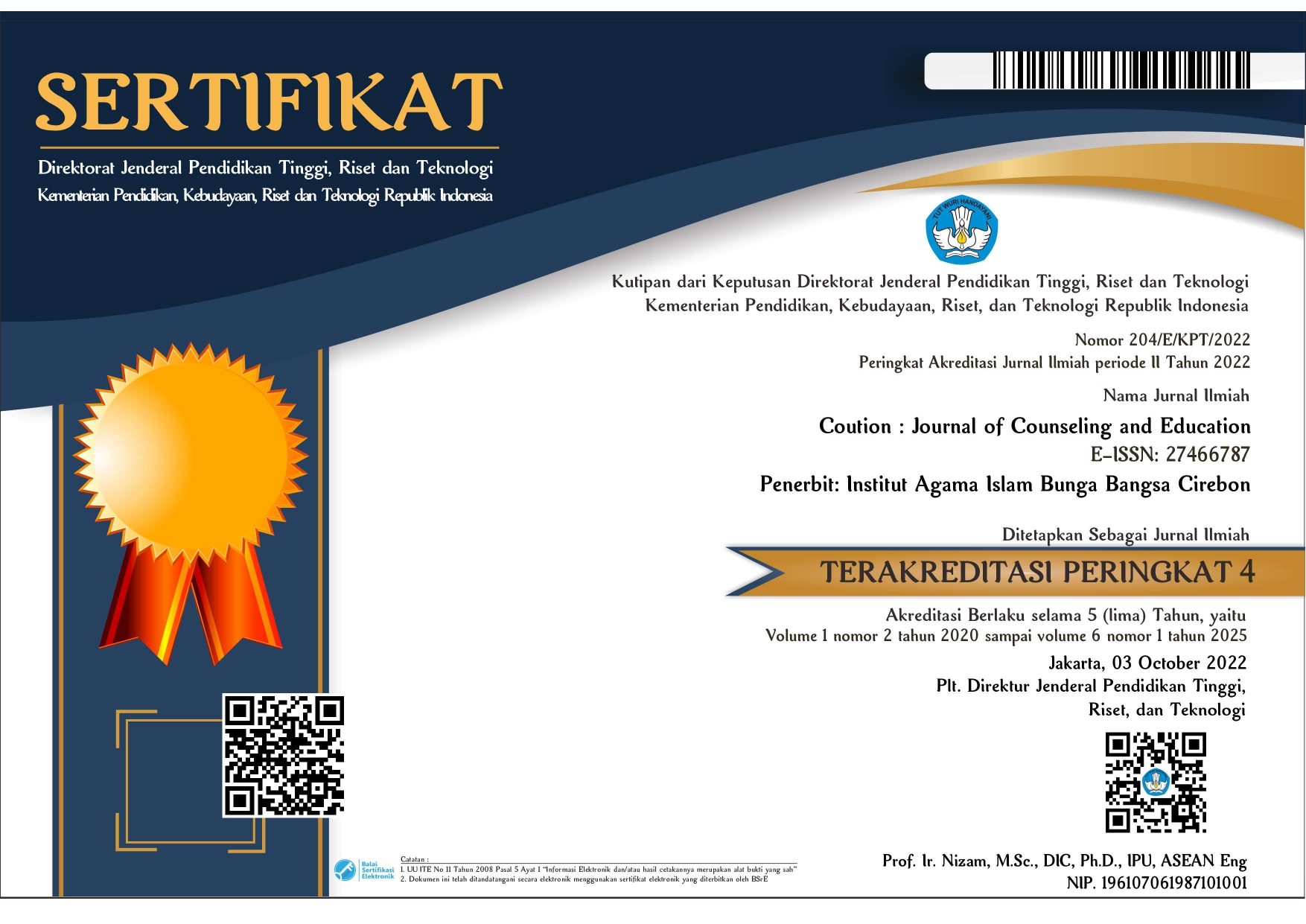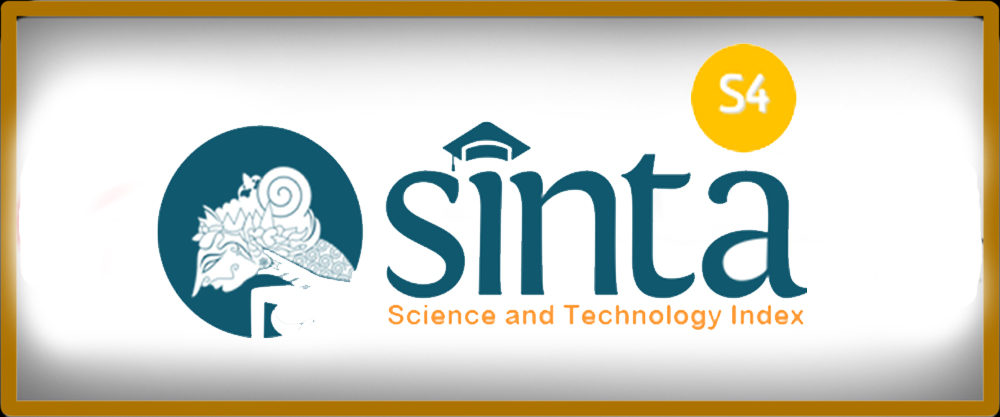Efektivitas Self-Regulated Learning Meningkatkan Prestasi Akademik Mahasiswa Dalam Pembelajaran Daring
Abstract
Penelitian bertujuan untuk mengetahui pengaruh self-regulated learning terhadap peningkatan akademik mahasiswa dalam pembelajaran daring. Desain penelitian ini adalah pre-experiment dengan dua kelompok yang dipilih secara random. Subjek yang digunakan dalam penelitian berjumlah 54 mahasiswa. Pengumpulan data menggunakan metode self-report, literature review, dan dokumentasi. Data dianalisis menggunakan uji Independent sample t-test. Hasil penelitian menunjukkan bahwa kelompok eksperimen yang diberikan perlakuan dengan materi self-regulated learning memiliki peningkatan indeks prestasi akademik (IP) yang lebih tinggi dibandingkan dengan kelompok kontrol. Hasil analisis data menunjukkan nilai p < 0,003. Kelompok eksperimen yang diberi perlakuan memiliki nilai rata-rata indeks prestasi (IP) dalam pembelajaran daring lebih tinggi dengan rerata mean = 2,78, sedangkan kelompok kontrol dengan rerata mean = 2,47.
Downloads
References
Strategies And Academic Performance. The Internet and Higher Education, 33, 24–32.
https://doi.org/10.1016/j.iheduc.2017.01.004
Broadbent, J., & Poon, W. L. (2015). Self-Regulated Learning Strategies & Academic
Achievement in Online Higher Education Learning Environments: A Systematic Review.
The Internet and Higher Education, 27, 1–13.
https://doi.org/10.1016/j.iheduc.2015.04.007
Chang, M.-M. (2005). Applying Self-Regulated Learning Strategies in a Web-Based
Instruction—An Investigation of Motivation Perception. Computer Assisted Language
Learning, 18(3), 217–230. https://doi.org/10.1080/09588220500178939
Cho, M.-H., & Shen, D. (2013). Self-Regulation in Online Learning. Distance Education,
34(3), 290–301. https://doi.org/10.1080/01587919.2013.835770
Chung, M.K. (2000). The development of self-regulated learning. The Institute of Asia Pasific
Education Development, 1, (1), 55-56.
Clemons, T.L. (2008). Underachieving gifted students: A social cognitive model. The National
Research Centre on The Gifted and talented. Universutay of Virginia.
Dunn, K. E., Rakes, G. C., & Rakes, T. A. (2014). Influence of Academic Self-Regulation,
Critical Thinking, and Age on Online Graduate Students’ Academic Help-Seeking.
Distance Education, 35(1), 75–89. https://doi.org/10.1080/01587919.2014.891426
Hawadi, A. (2006). Akselerasi. Jakarta: Grasindo
Kizilcec, R. F., Pérez-Sanagustín, M., & Maldonado, J. J. (2017). SelfRegulated Learning
Strategies Predict Learner Behavior and Goal Attainment in Massive Open Online
Courses. Computers & Education, 104, 18–33.
https://doi.org/10.1016/j.compedu.2016.10.001
Lim, D. H., Morris, M. L., & Kupritz, V. W. (2007). Online vs. Blended Learning: Differences
in Instructional Outcomes and Learner Satisfaction. Journal of Asynchronous Learning
Networks, 11(2), 27–42. Retrieved from https://www.learntechlib.org/p/104046/
Montalvo, F.T., Torres, M.C.G. (2004). Self-regulated learning: Current and Future Directions.
Spain: Departement of Education: University de Navarra. Electronic Journal of Receach
in Educational Psychology, 2 (1),
http://www.investigacionicopedagogica.org/revista/articulos/3/english/Art_3_27.
Pamungkas, A. H., & Wahyudi, W. A. (2020). Covid-19, Family, and Information Literacy.
KOLOKIUM: Jurnal Pendidikan Luar Sekolah, 8(1), 83–91.
https://doi.org/10.24036/kolokium-pls.v8i1.395
Panadero, E. (2017). A Review of Self-Regulated Learning: Six Models and Four Directions
for Research. Frontiers in Psychology, 8, 1–28. https://doi.org/10.3389/fpsyg.2017.00422
Pintrich, P. R. (1995). Understanding Self?Regulated Learning. New Directions for Teaching
and Learning, 63, 3–12. https://doi.org/10.1002/tl.37219956304
Ratnafuri, I., & Muslihati, M. (2020). Efektifitas Pelatihan Self Regulated Learning dalam
Pembelajaran Daring untuk Meningkatkan Ketuntasan Belajar Siswa di Masa Pandemi
Covid-19. Prosiding Seminar Nasional Bimbingan Dan Konseling Mengukuhkan
Eksistensi Peran BK Pasca Pandemi Covid-19 Di Berbagai Setting Pendidikan, 16–22.
Malang: Universitas Negeri Malang. Retrieved from
http://conference.um.ac.id/index.php/bk2/article/view/75
Wang, C.-H., Shannon, D. M., & Ross, M. E. (2013). Students’ Characteristics, Self-Regulated
Learning, Technology Self-Efficacy, and Course Outcomes in Online Learning. Distance
Education, 34(3), 302–323. https://doi.org/10.1080/01587919.2013.835779
Wicaksono. (2020, October 16). Pendidikan Indonesia Kala Pandemi, Persoalan yang Lebih
Besar daripada Sekadar Kuota Internet. Liputan6.Com. Retrieved from
https://www.liputan6.com/news/read/4383685/special-contentpendidikan-indonesiakala-pandemi-persoalan-yang-lebih-besardaripada-sekadar-kuota-internet
Wolters, C.A, Pintrich,P.R.,& Karabenick,S.A. (2003). Assesing Academic Selfregulated
Learning. Prepared for the Conference on Indicators of Positive
Development:ChildTrends.
http://www.childtrends.org/Files/Child_Trends2003_03_12_PD_PDConfWPK.pd
Yukselturk, E., & Bulut, S. (2009). Gender Differences in Self-Regulated Online Learning
Environment. Technology Support for Self-Organized Learners, 12(3), 12–22.
Retrieved from https://www.jstor.org/stable/jeductechsoci.12.3.12
Yulanda, N. (2017). Pentingnya Self Regulated Learning Bagi Peserta Didik dalam Penggunaan
Gadget. Research and Development Journal of Education, 3(2), 164–171.
https://doi.org/10.30998/rdje.v3i2.2013
Zimmerman, B. J. (2022). Becoming a Self-Regulated Learner: An Overview. Theory Into
Practice, 41(2), 64–70. https://doi.org/10.1207/s15430421tip4102_2



















